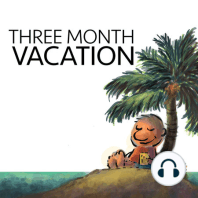7 min listen

Stories That Cause Clients To Instantly Sit Up And Take Notice - Part Three
Stories That Cause Clients To Instantly Sit Up And Take Notice - Part Three
ratings:
Length:
15 minutes
Released:
Dec 11, 2014
Format:
Podcast episode
Description
Should stories be dramatic? Incredibly, the answer is NO. Drama comes from the 90% principle. And this means that your audience needs to know 90% of your story in advance. And that's one of the elements that make storytelling incredibly powerful. To find more podcast options, go to http://www.psychotactics.com/podcast To get a short, yet beautiful headline report on "Why Headlines Fail", go to http://www.psychotactics.com ==== Transcript: Sean D'Souza:Hi, this is Sean D'Souza from psychotactics.com. Speaker 2:And I'm his evil twin. Sean D'Souza:And you're listening to the three month vacation podcast. This podcast isn't some magic trick about working less. Instead it's about how to really enjoy your work and enjoy your vacation time. Some people are considered to be natural born storytellers and that's all of us by the way. When you were five years old, you came back from school and you told a whole bunch of stories and you did it perfectly well. You put in the drama, you put in the suspense, you changed your tone, you did everything powerfully and wonderfully. Then as you grow up, you get a little more judgmental about your stories and you think that other people are better storytellers than you and it's true. Storytelling is a craft. When you're five years old, everyone listens to you because it's true, but as you grow up, you have to craft it. We'll take a little trip and find out what's involved in storytelling. Now this is just a little bit of the entire series that I've written on storytelling but it will give you a good gist of what to expect from that book, that series, and because these questions were put to me off-the-cuff, I am probably going to answer things that you probably won't find in those books or that series. It's a win-win situation and I think you should get the series from Psychotactics but for now listen in and let's get on this storytelling rollercoaster, shall we? In this series, we're going to cover a lot of topics, probably 10 in all but we'll start off with the main topic and that is what makes a good storyteller. There are clear attributes to be found in good storytelling. One of the attributes of a storyteller is they should know when to tell a story and when not to tell a story. You can't always tell a story just about anywhere. One of the good places to tell story is when you are starting up something. If I started off this thing with a story, you'll say let me tell you about the time we were in London. Immediately that gets your attention. The other place when you need to tell stories is once you have given some information. Stories almost act like an example, like a case study and so they help the listener understand, comprehend what you just said. A storyteller needs to know this. They need to know that it's not just about telling story after story after story. Instead they need to know where to tell the story, when to tell the story, how long that story needs to be. That's what makes a good storyteller. This takes us to our second point. What can you do to improve your storytelling? Let's find out. There's an amazing series on Africa and the narrator of that series, which is a BBC series, is David Attenborough. Now David Attenborough talks about the resurrection plant and he talks about how the resurrection plant is out there in the desert and how it starts to roll and roll, and then it could be like that, rolling for 20 years, 30 years, 40 years, maybe even 100 years. Then at some point in time, it runs into a puddle of water and that's when the resurrection plant comes to life. Immediately, in a couple of hours, it starts to grow. It's almost like watching something on video in fast motion. Then the resurrection plant is not done. It has to wait for the second phenomenon which is the rain has to come, and the rain has to then hit the petals. The petals have to drop on the floor and new resurrection plants come up. Within a few days, all of them dry up. They shrivel up and then they be
Released:
Dec 11, 2014
Format:
Podcast episode
Titles in the series (100)
Is The Four-Hour Work Week A Waste Of Time?: Why A Four-Hour Workweek Isn't What We Really Want by The Three Month Vacation Podcast